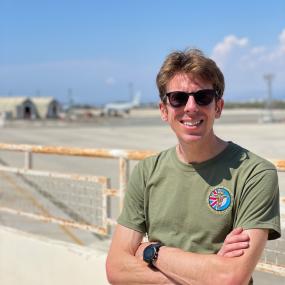Things I’ve learnt in my first year as an ICM Consultant

David is a Royal Air Force consultant in critical care and anaesthesia who works at the Royal Infirmary of Edinburgh and for the RAF Critical Care Air Support Team. His interests are critical care echocardiography and aeromedical transfer.
Looking back over the the past twelve months, I’m surprised by how quickly the time has passed since I completed training and started working as a consultant in ICM and anaesthesia. Contrary to what I perhaps expected, I’ve almost certainly learned more during the past year than in any comparable period as a registrar.
Not just in terms of clinical knowledge (although I’m surprised how much I found I had to keep learning to deliver the best care to my patients), but also about how to fit into and leads team as a permanent member of staff, and how to contribute meaningfully to the behind-the-scenes aspects of any intensive care unit that I didn’t really appreciate existed as a trainee. Whilst everybody’s experience as a new consultant will differ, and I don’t pretend to offer universally-applicable advice, these are some of the learning points that I found most striking during the past year.
- Whilst clinical work can be challenging, particularly when taking high-stakes decisions in the middle of the night, you’re never really without access to advice from experienced colleagues. Knowing when to sense-check a decision, discuss a challenging case or seek a second opinion on an unusual scenario is an important skill to develop. Even more important is knowing what you want from this advice – is to to gain support for the decision you’ve already taken, or do you want to ask a colleague who you know will think differently and who will challenge you to revisit your clinical decision-making?
- Working in a department as a permanent member of staff feels quite different to being a registrar in that same department. I’ve really valued the opportunity to work more closely with the nursing staff and allied health professionals than I was able to do whilst rotating through departments on a more short-term basis.
- All intensive care consultants need to be leaders, not just in delivering clinical care but also in developing trainees and developing their department. This comes easier to some than others and needs constant practice to do well, but never forget that as a leader you set the tone for what happens when you’re working. Have high standards of yourself, work hard to bring your best self to work and aim to be a role model for those you’re training.
- Conversely, you need to learn to be a good follower too. NHS management structures can seem a bit irrelevant as a trainee (I certainly didn’t know the difference in roles between the clinical and medical directors, for example) and appreciating this, as well as the wider priorities of your organisation, can certainly help with developing better followership skills.
- Imposter syndrome is normal and probably to be expected, particularly so if you’re appointed to a consultant job in a department you’ve trained in and are now consultant colleagues with your previous bosses. Comparing yourself unfavourably to others can be a route to misery. One solution is to find a good and experienced mentor who you trust and respect, and who can help you rationalise your way out of this kind of thinking.
- Differences of opinion about how to manage a patient are normal – between specialities, with other ICU consultant colleagues, or between different groups in the multidisciplinary team. It can be easy to feel defensive if you perceive your management is being criticised, but learning to manage these competing viewpoints in a collegiate matter whilst seeking the best path forward for the patient in front of you is one of the inevitable challenges of consultant life.
- It’s important to keep challenging yourself. Freedom from the demands of a training programme is intoxicating at first, but I also found it important to set goals for how I wanted to develop as a consultant. There are a lot of directions your consultant career can take, and whilst a few months settling in and enjoying the transition from being a registrar was something I enjoyed, by the end of my first year I felt like I needed to set some longer term career goals and work out how to achieve them.
- Finding your work-life balance can be challenging. It’s easy to say yes to things, particularly if you’re enthusiastic by nature and attracted to the project, but be wary of taking on too many enduring responsibilities in your first year. Whilst the advent of remote-working has meant a lot of SPA responsibilities, CPD and ICU meetings can be done from home, this can blur the lines between work and home and you need to work out how to protect your home life too.
- Being an ICU consultant can generate a lot of clinical admin. Work out a strategy for dealing with this effectively. Either you dominate the admin, or the admin will dominate you.
This list could probably be endless and asking other new consultants will generate lots of other points. The first year in a new role with increased responsibilities with always be challenging, but ultimately this is what makes it most rewarding too.
